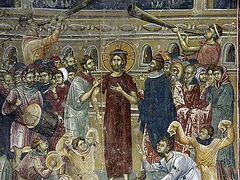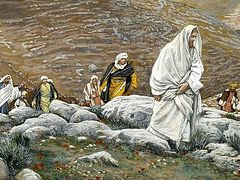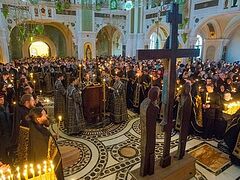“Behold, the Bridegroom cometh at midnight, and blessed is the servant whom He shall find watching; and again, unworthy is the servant whom He shall find heedless. Beware, therefore, O my soul, do not be weighed down with sleep, lest you be given up to death and lest you be shut out of the Kingdom. But rouse thyself crying: Holy, holy, holy, art Thou, O our God. Through the Theotokos, have mercy on us.”
Who is this mysterious Bridegroom Who comes at midnight? To whom does He come, and what does midnight represent? And again, who is this servant who is watching and therefore blessed, and who is that heedless servant who is therefore unworthy to meet the Bridegroom?
I am certain, my brethren, that many of you have already asked yourselves these questions and have resolved them according to the instructions of the Gospel and the needs of your hearts and souls, so that when the holy Church proclaims: “Behold, the Bridegroom cometh!” you already know Whom we await and what is required from each of us in order to meet Him. Howbeit, says the Apostle, there is not in every man that knowledge (1 Cor. 8:7). There are those who even in broad daylight require a guide, some because of poor vision, others because they don’t know the way, although it’s not far away, and others because of an unwillingness to go. Therefore, it won’t be superfluous if we, as befits the day, think out loud about the coming of the Bridegroom, so that even those who haven’t pondered it before can clearly see who they are: a watchful and therefore blessed servant, or a heedless and unworthy and therefore rejected servant.
Therefore, let us say that the wonderful Bridegroom coming at midnight is our dearest Savior, the Lord Jesus Christ. Among the many significant names applied to Him in the Word of God, He bears the name of our Bridegroom, because our soul is betrothed to Him, as a bride to a bridegroom, for an ever-present and perfect union with Him through faith, love, and beatitude. I have espoused you to one Husband, writes the Apostle Paul to the Corinthians, that I may present you as a chaste virgin to Christ (2 Cor. 11:2). From the side of our Divine Bridegroom, this holy betrothal took place upon the Cross, where He, out of love for us, to redeem our souls from sins and curses, and to receive us to Himself for all eternity, suffered death and shed all of His Blood. This precious betrothal is accomplished by His direct order through the Sacrament of Baptism that we receive, when renouncing the world, the flesh, and the devil, we are united to Christ our God as a bride to her bridegroom. From the time of this betrothal, we are, in the expression of Apostle Paul, no longer our own (cf. 1 Cor. 6:19), but rather we belong body and soul to our Redeemer and Lord.
It is just as it is between two people—marriage doesn’t immediately follow after betrothal, and the betrothed are separated from each other for a time before marriage; the same occurs in our betrothal to Christ. For many important reasons, the marriage is postponed, and the Bridegroom Himself must separate from us for our own good. This followed, as we know, on the fortieth day after His Resurrection, when He ascended to Heaven from the Mount of Olives. He left us many signs of love as a pledge of our union with Him: We have His holy Word, we have His Life-giving Cross, we have His Most Pure Body and Blood, we have the Church—the bride-to-be—and His counsels as our companion—we have the Sacraments of the Church and the grace of the All-Holy Spirit; but He Himself, the Bridegroom of our souls, has been invisible since then and will remain as such until the end of our separation from Him—that is, until the last day of the world, when He will appear again in glory for the celebration of the universal marriage feast.
How long will this separation last, this delay of the mystery marriage of the Lamb? Only the Bridegroom of hearts and souls knows. When will He come? What day and year, at what hour? Again, this is a mystery to everyone. But of that day and hour, He Himself said, knoweth no man, no, not the angels of Heaven (Mt. 24:36). And this deep unknowing constitutes this mysterious midnight in which, according to the Church hymn we are considering, the Bridegroom cometh; for midnight is that time when not only all our affairs, but all our expectations stop; and people, expecting nothing more from the day, give themselves over to sleep. Thus, the time of the coming of the Heavenly Bridegroom is unknown. But on the other hand, nowhere is it said that this coming will occur only after a long time, but it is obvious that it could always occur, at any day and hour; and therefore those who are betrothed to the Heavenly Bridegroom—that is, all of us—should ever be ready to meet the Bridegroom, ever awaiting Him, not departing, so to speak, off into the distance, not doing anything that could prevent us from being on time for His coming. This is why the Bridegroom Himself commanded us before His separation from us: Watch therefore, He said, for ye know neither the day nor the hour wherein the Son of Man cometh (Mt. 25:13).
Those who are faithful to their betrothal and vow, who truly love the Bridegroom of souls, have always done so and continue to do so. They are always on guard; their first and last expectation in life is to look for the coming of the Bridegroom. To hear the voice: “Behold, the Bridegroom cometh!” would be the height of their earthly bliss. To make themselves more capable of awaiting and meeting Him, many of them left the world and everything in it to this end. They renounced forever even the most innocent pleasures and earthly ties, so that the love for the Bridegroom in their souls would not, due to the weakness of nature, cool by engaging in too many worldly matters; so as not to divide their attention and zeal, not to become heavy in spirit and not indulge in the sleep of sensuality.
Others, without leaving the world, participate in all its movements and affairs, but live, however, as though not in the world. They don’t allow their hearts to cling to anything; they subordinate all their daily affairs and relations to one principle—love for Jesus. And wherever they are, whatever they’re doing, they’re always ready to joyfully abandon all affairs and all earthly acquisitions at the first voice of the coming of the Bridegroom. All such people, whether outside the world or living in the world, are obviously watchful servants. The Bridegroom sees their zeal and prepares a crown of glory for each of them; and they are truly blessed, no matter how low and bitter their faith on earth, for all hardships and sufferings to which they may be subjected here are temporary and fleeting, and in the future, blessedness awaits them for this—blessedness such that eye hath not seen, nor ear heard, neither have entered into the heart of man (1 Cor. 2:9).
But there are also those who are betrothed to the Heavenly Bridegroom who have completely forgotten their vows, who don’t even remember that they have a Bridegroom, that His coming should always be awaited, and that it will be bad, very bad for those who at the time of His coming are found sleeping. Are there many such people among Christians? So many that the Word of God therefore calls them all: While the bridegroom tarried, they all slumbered and slept (Mt. 25:5).
And truly, my brethren, how many such Christians can you point to, saying confidently: “This is a servant who watches at midnight!” The future coming of our Lord and Savior has become a subject that no one wants to talk about, and if anyone started talking about it somewhere, he’d seem like a strange man, engaged in matters that don’t deserve the attention of so-called educated people or businessmen. Meanwhile, the future coming of the Lord is an event that is extremely important for everyone, upon which our future fate completely depends, with which either all blessings or all afflictions should come to us. All this cannot rouse attention in us, and all this is like something completely foreign to us! In vain does the Gospel say with power: Watch therefore … for in such an hour as ye think not the Son of Man cometh (Mt. 25:13, 24:44). In vain does the holy Church exclaim: “Behold, the Bridegroom cometh at midnight!” We hear but don’t hearken; we hear, and instead of preparing ourselves to meet the Bridegroom, we carelessly indulge in worldly vanities, as if we’ll remain on Earth forever. How many Christians there are who are already ending their lives, who don’t even know that their soul has a Bridegroom, and that they may even live to see His coming!... What is to blame for such an unforgivable coldness to the Heavenly Bridegroom of hearts and souls? The fault lies with our boundless predilection for earthly goods, our immersion in sensuality. Our hearts are divided among so many objects that there’s no longer any place for the Beloved there. Everything is given to the world and the flesh! Everything is in captivity to the vices and passions!
It would be vain, completely in vain, to excuse our carelessness by referring to the slowness of the Bridegroom’s Coming, for this slowness is only from one perspective, but from the other, it’s an extraordinary rapidity. It doesn’t matter whether He comes to us or we go to Him. He’s delaying His arrival, and perhaps it will take another thousand years; and will we still be here waiting for Him for these thousands of years? No, now, tomorrow, the angel of death will appear and call us to the Bridegroom. After that, how can we sleep carelessly and not wait for the call and departure that is coming for us? Especially when it’s clearly not far for everyone and at the same time completely unknown? For likewise, no one knows of the day and hour when our life will end—it’s our own midnight!
But, alas, we should also say about it what is said about the midnight in which the Bridegroom cometh: They all slumbered and slept! (Mt. 25:5). Preparation for death is a matter so important that it should occupy our entire lives—it’s not even considered work. Those who engage in it as they should are an exception, and rather rare. Everyone else lives as if they’ll live here forever. The diseases that visit us, those visible forerunners and heralds of death, can’t force us to think about it. Alas, no matter how many dying people we have seen, we’ve almost never seen those who knew beforehand that they would be finally parting with their lives. Many, on the contrary, even a few hours and minutes before death, still indulge in thoughts about earthly things, thinking about living, not abandoning thoughts about such matters and undertakings that require strength and a long life. This is how the young die; this is how even the very elderly sometimes die. You can thereby judge in what forms these unfortunate souls will appear before their Heavenly Bridegroom, and what will befall them at the wedding feast!
With such a terrible example of carelessness, in the midst of this unrelenting vortex of vanity and passions, blinding the eyes of even, apparently, the best people with dust—should not everyone, my brethren, who values his own salvation even a little have some fear, turn to themselves, and say in the words of the sacred hymn: “Beware, therefore, O my soul, do not be weighed down with sleep, lest you be given up to death!” Beware—don’t be captivated by any example, don’t follow any path that seems to be covered with flowers but which leads to the abyss of Hell. Beware—stand on guard until it changes; keep faith and hope until your hope itself appears. We don’t see the Bridegroom, but He’s always near to you and sees all of your thoughts and desires, and counts all your labors and sacrifices, and prepares a crown for all of them. Another few years, perhaps weeks, days of patience, and the veil will fall, the world and everything in it will disappear from before your eyes, the Heavenly bridal chamber will appear, and you will be led into the marriage of the Lamb!
Amen.




